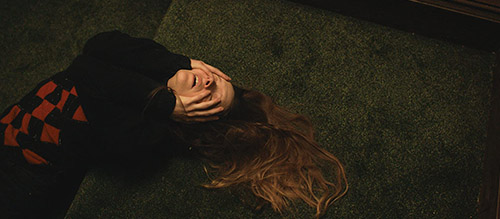Saint Maud (2020) Review
Saint Maud (2019/20)
Director: Rose Glass
Screenwriter: Rose Glass
Starring: Morfydd Clark, Jennifer Ehle, Lily Knight, Lily Frazer, Turlough Convery, Rosie Sansom, Marcus Hutton
The last few years have seen an interesting trend in indie horror filmmaking. Largely eschewing run-of-the-mill jumps and shocks, films like The Witch, It Follows and Hereditary have taken the horror genre to a more thoughtful, dialed-back and atmospheric place. Saint Maud is the latest horror of this mindset and is a remarkably assured and tricky directorial debut from Rose Glass, not to mention the film that puts Morfydd Clark on everyone’s star radar.
Devout Christian nurse Maud (Morfydd Clark) accepts her latest post caring for Amanda (Jennifer Ehle), a former dancer with terminal cancer. Believing she is receiving guidance from the Almighty, Maud strives to save her patient’s soul in time for her to pass on, but before long her own faith is tested as her past actions resurface.
Saint Maud may be one of the few religious horror films that presents God as an antagonistic force. Whenever Maud feels God’s presence informing her actions, she appears rapt by ecstasy or agony depending on how she is currently living her life. God seems to veer between being a cruel and loving deity on a whim, and so Maud resorts to keeping his attention on her by indulging in sinful practices as her prayers go unanswered. But there may be more than one force manipulating her throughout this story. God or the Devil, or whoever is sending her messages, is acting less divine and more like an earthbound abusive spouse Maud is utterly besotted with.
When God actually appears, he’s represented by a Welsh-speaking cockroach (credited as “Nancy the Cockroach”, film fact fans!) who hangs around the crucifix Maud hangs in her flat. The Welsh thing may be a reference to Morfydd Clark’s heritage or because, as one of the UK’s most ancient languages, it can sound otherworldly.
Having a strong faith in of itself is not demonised in Saint Maud, but when your religion is the only thing that you live for – so much so that you follow what you believe are commands from God without question – that is when you start to lose yourself. Maud seems fundamentally a good person, but is perhaps doing the right things for the wrong reasons, providing palliative care more to be close to her patients in their final moments (and thereby reach Heaven by osmosis as they pass on) than to actually be there for their comfort. She objects to Amanda’s still busy social life and romances, to any distraction from her agonising terminal illness, because it means that Amanda is not there in the moment, her pain is not bringing her close to God.
Maud is an enigma, she seems to have a dark and shameful past and has reinvented herself multiple times to start her life again, her conversion and adoption of the Maud name being the latest of these. Figures from her past re-emerge along with painful reminders of who she used to be. Her religion is now all she lives for, it’s what she is prepared to suffer for, and a belief she wants to impart on others. She may be pious, even fanatical, and dedicated to her profession as a nurse, but she lets her own pride take over from compassion in her warped view of the world. Clark’s performance is one of real power and her commitment never wavers.
While Rose Glass makes the film utterly her own, folding in Ben Fordesman’s picturesque cinematography, Adam Janota Bzowski’s rumbling score and a sparing but beautiful use of special effects throughout, the uncomfortable mood and uneasy atmosphere is very reminiscent of contemporary directors like Robert Eggers. You particularly think of The Witch (interestingly the films share a casting director), a film that has a long and understated build-up to a final act that goes completely off the chain. The horrifying imagery in the closing stretch of Saint Maud more than makes up for the measured pacing and relatively uneventful early stretch of the story.
The pacing of the film may be what puts some viewers off. There are salty remarks about employers, and a bit of body horror and sinful excess, but otherwise you walk through this one almost unconsciously, like you’re in a fever dream. It’s certainly one to experience, though many will likely find it grueling or even oppressive despite there not being an ounce of fat on the runtime, and; who knows what a viewer with a strong religious faith might think the film is saying about them?
Saint Maud uses religion as an addictive plot device, faith as the most dangerous and damaging thing for a human to be ruled by. Religion can be a life-saver for many, it can bring peace to the soul, but if there is no other force or motivation in your life, you can become a tragic lost soul obsessed with proving herself to a God who may not even be listening, just like Maud. This is challenging stuff for a horror film, but it’s mesmerising and tactile and connective as well.
20/24


